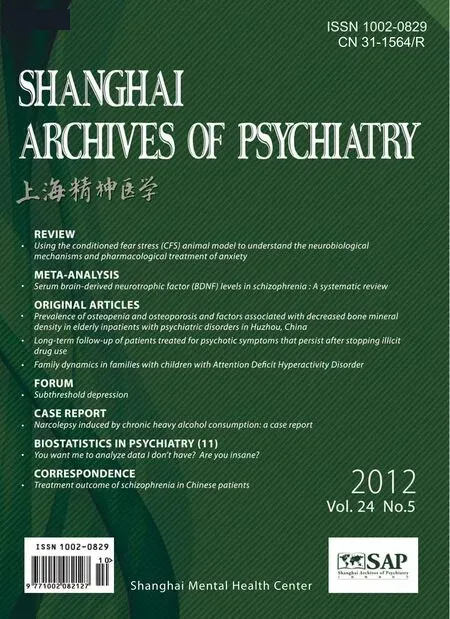Treatment outcome of schizophrenia in Chinese patients
Ee Heok KUA*
· Correspondence ·
Treatment outcome of schizophrenia in Chinese patients
Ee Heok KUA*
Published data on treatment outcomes for schizophrenia primarily come from North America and Europe; there is a relative dearth of information from Asia. The recent publication in theShanghai Archives of Psychiatryby Li and colleagues[1]from Sichuan, China, sheds light on the natural history of schizophrenia in Chinese populations. The community program for the identification and management of psychoses in rural areas described in the paper – the so-called ‘686 Project’– is unique. Studies coordinated by the World Health Organization in the 1980s[2]found that patients with schizophrenia from low-income countries had a more benign course than those from high-income countries, a finding that is confirmed by a more recent worldwide outcomes study of schizophrenia.[3]
Attention is now being focused on the factors that may influence long-term prognosis in schizophrenia. Li and colleagues[1]report that treatment adherence, level of education, and short duration of illness are the best predictors of better outcomes. But one important factor is missing from this list: family support. Though not stated in the paper, one expects that in rural Sichuan almost all of the patients are living with family members. This is quite different from the situation for most patients with schizophrenia in North America or Europe who are more likely to live in hostels or sheltered residences after discharge from hospital.
A long-term follow-up study of schizophrenia in Singapore[4]– in which 90% of the patients were Han Chinese – confirmed previous reports that the duration of untreated psychosis is a predictor of outcome in first-episode schizophrenia; so reducing delay in initial detection and treatment is important to improving long-term prognosis. Interestingly, this study also found that all the patients with good outcomes were living with their families. For patients with chronic disabling conditions like schizophrenia, the family provides the basic necessities of shelter, food and finance support; but, perhaps even more importantly, it also provides emotional support and encouragement in treatment adherence.
1. Li QJ, Huang XY, Wen H, Liang XQ, Lei L, Wu JL. Retrospective analysis of treatment effectiveness among patients in Mianyang Municipality enrolled in the national community management program for schizophrenia.Shanghai Arch Psychiatry2012; 24(3): 131-139.
2. Leff J, Sartorius N, Jablensky A, Korten A, Ernberg G. The International Pilot Study of Schizophrenia: Five-year follow-up findings.Psychological Medicine1992; 22(1): 131-145.
3. Haro JM, Novicte D, Bertsch J, Karagianis J, Dossenbach M, Jones P. Cross-sectional clinical and functional remission rates: Worldwide schizophrenia outpatient health outcomes.Br J Psychiatry2011; 199(3): 194-201.
4. Kua J, Wong KE, Kua EH, Tsoi WF. A 20-year follow-up study of schizophrenia in Singapore.Acta Psychiat Scand2003; 108(2): 118-125.

Ee Heok Kua
a MBBS from the University of Malaya, Kuala Lumpur and an MD from the National University of Singapore. He also received his MRCPsych and FRCPsych from the Royal College of Psychiatrists in the UK and received additional training in geriatric psychiatry at Harvard University and in psychiatric research methods at the National Institute of Mental Health, in the USA. He is currently a professor and senior consultant psychiatrist at the National University of Singapore and the president of the Pacific-Rim College of Psychiatrists. His research interests include aging, depression, and dementia.
10.3969/j.issn.1002-0829.2012.05.012
Department of Psychological Medicine, National University of Singapore, Singapore
*correspondence: pcmkeh@nus.edu.sg
- 上海精神医学的其它文章
- You want me to analyze data I don’t have? Are you insane?
- Narcolepsy induced by chronic heavy alcohol consumption: a case report
- Understanding subthreshold depression
- Differentiation of various forms of depression
- Distinguishing subclinical (subthreshold) depression from the residual symptoms of major depression
- Are subsyndromal symptomatic depression and major depressive disorder distinct disorders?

